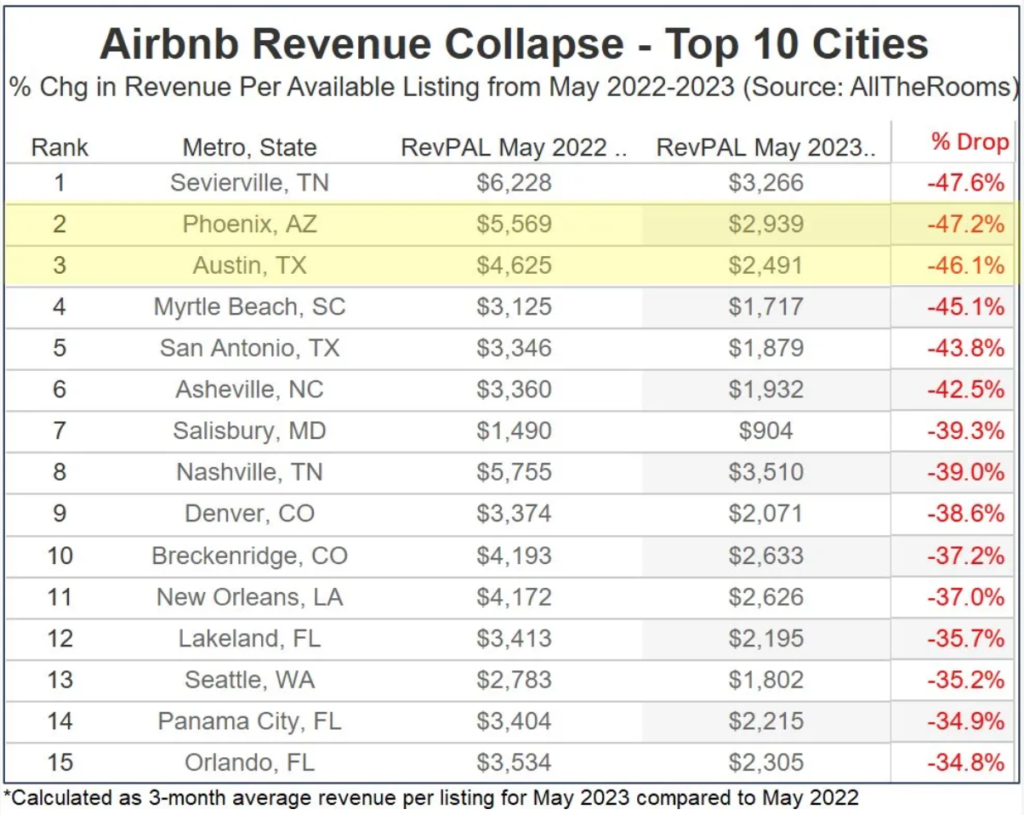Trust This. July 7, 2023.
By Joseph E. Seagle, Esq. Happy Friday! It’s World Chocolate Day [...]
By Joseph E. Seagle, Esq.
Happy Friday! It’s World Chocolate Day in case you didn’t know. So enjoy your favorite chocolate-flavored anything today, guilt-free.

Social media real estate financial adviser, Nick Gerli, posted the chart above in a tweet on June 27, and it has been reposted over 10,000 times and garnered almost 55,000 likes as of last night.
Why it matters: His data from Alltherooms doesn’t match up to other data out there and appears to be completely inaccurate, as pointed out by James Kleimann with Housingwire.
By the numbers: Sevierville, TN is at the top of the Alltherooms list with a revenue decline of 47.6%. Orlando is in the number 15 spot at -34.8%, according to Gerli’s tweeted data.
Kleimann’s homework and help from AirDNA found that Sevierville and Orlando were, in fact, down on revenue but by only 9.4% and 10.5%, respectively.
Kleimann could not get actual data from Airbnb directly to verify it all, but the company said their data more closely matches AirDNA’s than Alltherooms’ data.
What they’re saying: Nick Gerli is a financial adviser who owns Reventure Consulting. I’ve seen him on social media over the past few months. His posts are often sensational clickbait posing as the-sky-is-falling economic analyses. He’s been known to cherry-pick data from various sources and spin them in ways that support his foregone conclusions. He’s not alone in this.
Yes, but: When confronted, Gerli (and other social media financial advisers like him) quickly concede that there are data discrepancies. Still, they don’t put a note on their posts or even qualify the conclusions within the posts.
The bottom line: You can’t believe everything you see on social media.
Clickbait is rampant because it drives eyes to the posts, garnering revenue for the poster.
Whenever a “sky is falling” or “this is the next greatest thing to do financially,” post pops up, don’t take it at face value.
Look behind the numbers.
Maybe even contribute your data to these sites to improve their accuracy.
Go deeper: Kleimann’s Housingwire article.

Three members of the Greater Tampa Realtor Association executive board have resigned over the past couple of weeks in protest over a conflict of interest by the Board’s president.
State of play: It started in February when the association’s executive committee agreed to hire Jason Outman as the Board’s new CEO.
But they didn’t announce his hiring until March 22.
On the same day, GTR’s president — Jay Quigley — acted as the buyer’s agent for Outman in entering a contract to purchase a home for $765,000.00.
Quigley received a 2.5% commission at the closing in April.
This raised the specter of a conflict of interest because the association president received a commission from a transaction where he represented the person his committee chose to hire as CEO.
Why it matters: The Executive Committee had a special meeting to address the violation of the REALTOR’s conflict of interest policy, but the decision from that meeting is confidential.
The vice president resigned, saying that the board’s verdict was correct, but the punishment was too lenient.
Another committee member resigned, saying that the Board wasn’t moving in a direction in the best interest of the membership.
A third member quit without giving a reason.
At least one more member is considering resigning as well.
The association amended its bylaws in 2020 to change the structure so that the membership at large no longer elected the officers. Instead, the 16 to 17-member Board of Directors now elects the officers of the Executive Committee.
This was the first board elected through that process which tends to appear that the board members are looking out for themselves instead of the association’s members at large.
Our take: Having served on and represented similar board structures, we understand how difficult it is to get volunteers to serve on them and to get a large membership base to vote for the most-qualified officers.
The bylaws changes were made during the height of the pandemic, which wasn’t the best time to make such a major structural change to a vital foundational process.
Trade associations like GTR have large groups of captive pay-to-play stakeholders and larger budgets.
GTR will have a hard row to hoe to regain their members’ trust, but the first step should be amending the bylaws again to restore the members’ ability to elect their officers and hold them accountable.

One-third of home purchases in April were cash-only. The Title Report
Housing inventory grew last week by 5,848 listings. In the same week last year, it grew by over 30,000 listings. Housingwire’s weekly housing tracker.
The top-5 cash flow markets for under $200,000.00 (spoiler alert: none are in Florida). Bigger Pockets
In May, lenders repossessed 4,020 properties through completed foreclosures (REOs). That’s up 38% from April and 41% from the same time a year ago. With defaults and foreclosures trending up, are servicers prepared to handle them? Mortgage Orb
Florida’s retirees flee to nearby states with lower insurance premiums and real property taxes. Where are they going? Go Banking Rates

I’ve often repeated that life isn’t a sprint; it’s a marathon. It’s something I’d heard soon after graduating from law school.
As I’ve aged, I’ve come to believe it’s more like a constant marathon of sprints, one after another. We run as fast as possible daily through our task lists, e-mails, voicemails, social media posts, and daily mail.
But do those things move us forward toward our targets? What if we have no strategic target, no finish line? Or worse, what if we’re racing toward the wrong target a la Sears and Blockbuster (great execution but wrong target)?
This is one reason we make goals for ourselves. We’re trained early to strive for the end of the semester, the end of the year, graduations, birthdays, and other milestones. It’s human nature to sprint through those milestones others have defined for us.
Visionary leaders focus on the next target for their business, their team, and themselves. They aren’t carried along with the crowd, sprinting without a strategic purpose. They actively strategize what their next target should be and who will help them reach it.
They surround themselves with superstars in their positions who are as dedicated to implementing the vision and reaching those targets as the visionary is.
They focus on their health and relationships as stridently as they focus on their business, and they surround themselves with coaches, counselors, and people smarter than they are to help them build their emotional intelligence and experience.
Why it matters: The next time you find yourself sprinting through the day on tasks and information that others have put in front of you, take a beat to think about whether you’re chasing the right target or just running to be running? And ask yourself if you’re surrounding yourself with the right team to help you figure out the right next goals then sprint toward those together.
We hope you found this helpful — any feedback is appreciated and can be shared by hitting reply or using the feedback feature below.
Have an idea or issue to share? Email us.
By Joseph E. Seagle, Esq.
Happy Friday! It’s World Chocolate Day in case you didn’t know. So enjoy your favorite chocolate-flavored anything today, guilt-free.

Social media real estate financial adviser, Nick Gerli, posted the chart above in a tweet on June 27, and it has been reposted over 10,000 times and garnered almost 55,000 likes as of last night.
Why it matters: His data from Alltherooms doesn’t match up to other data out there and appears to be completely inaccurate, as pointed out by James Kleimann with Housingwire.
By the numbers: Sevierville, TN is at the top of the Alltherooms list with a revenue decline of 47.6%. Orlando is in the number 15 spot at -34.8%, according to Gerli’s tweeted data.
Kleimann’s homework and help from AirDNA found that Sevierville and Orlando were, in fact, down on revenue but by only 9.4% and 10.5%, respectively.
Kleimann could not get actual data from Airbnb directly to verify it all, but the company said their data more closely matches AirDNA’s than Alltherooms’ data.
What they’re saying: Nick Gerli is a financial adviser who owns Reventure Consulting. I’ve seen him on social media over the past few months. His posts are often sensational clickbait posing as the-sky-is-falling economic analyses. He’s been known to cherry-pick data from various sources and spin them in ways that support his foregone conclusions. He’s not alone in this.
Yes, but: When confronted, Gerli (and other social media financial advisers like him) quickly concede that there are data discrepancies. Still, they don’t put a note on their posts or even qualify the conclusions within the posts.
The bottom line: You can’t believe everything you see on social media.
Clickbait is rampant because it drives eyes to the posts, garnering revenue for the poster.
Whenever a “sky is falling” or “this is the next greatest thing to do financially,” post pops up, don’t take it at face value.
Look behind the numbers.
Maybe even contribute your data to these sites to improve their accuracy.
Go deeper: Kleimann’s Housingwire article.

Three members of the Greater Tampa Realtor Association executive board have resigned over the past couple of weeks in protest over a conflict of interest by the Board’s president.
State of play: It started in February when the association’s executive committee agreed to hire Jason Outman as the Board’s new CEO.
But they didn’t announce his hiring until March 22.
On the same day, GTR’s president — Jay Quigley — acted as the buyer’s agent for Outman in entering a contract to purchase a home for $765,000.00.
Quigley received a 2.5% commission at the closing in April.
This raised the specter of a conflict of interest because the association president received a commission from a transaction where he represented the person his committee chose to hire as CEO.
Why it matters: The Executive Committee had a special meeting to address the violation of the REALTOR’s conflict of interest policy, but the decision from that meeting is confidential.
The vice president resigned, saying that the board’s verdict was correct, but the punishment was too lenient.
Another committee member resigned, saying that the Board wasn’t moving in a direction in the best interest of the membership.
A third member quit without giving a reason.
At least one more member is considering resigning as well.
The association amended its bylaws in 2020 to change the structure so that the membership at large no longer elected the officers. Instead, the 16 to 17-member Board of Directors now elects the officers of the Executive Committee.
This was the first board elected through that process which tends to appear that the board members are looking out for themselves instead of the association’s members at large.
Our take: Having served on and represented similar board structures, we understand how difficult it is to get volunteers to serve on them and to get a large membership base to vote for the most-qualified officers.
The bylaws changes were made during the height of the pandemic, which wasn’t the best time to make such a major structural change to a vital foundational process.
Trade associations like GTR have large groups of captive pay-to-play stakeholders and larger budgets.
GTR will have a hard row to hoe to regain their members’ trust, but the first step should be amending the bylaws again to restore the members’ ability to elect their officers and hold them accountable.

One-third of home purchases in April were cash-only. The Title Report
Housing inventory grew last week by 5,848 listings. In the same week last year, it grew by over 30,000 listings. Housingwire’s weekly housing tracker.
The top-5 cash flow markets for under $200,000.00 (spoiler alert: none are in Florida). Bigger Pockets
In May, lenders repossessed 4,020 properties through completed foreclosures (REOs). That’s up 38% from April and 41% from the same time a year ago. With defaults and foreclosures trending up, are servicers prepared to handle them? Mortgage Orb
Florida’s retirees flee to nearby states with lower insurance premiums and real property taxes. Where are they going? Go Banking Rates

I’ve often repeated that life isn’t a sprint; it’s a marathon. It’s something I’d heard soon after graduating from law school.
As I’ve aged, I’ve come to believe it’s more like a constant marathon of sprints, one after another. We run as fast as possible daily through our task lists, e-mails, voicemails, social media posts, and daily mail.
But do those things move us forward toward our targets? What if we have no strategic target, no finish line? Or worse, what if we’re racing toward the wrong target a la Sears and Blockbuster (great execution but wrong target)?
This is one reason we make goals for ourselves. We’re trained early to strive for the end of the semester, the end of the year, graduations, birthdays, and other milestones. It’s human nature to sprint through those milestones others have defined for us.
Visionary leaders focus on the next target for their business, their team, and themselves. They aren’t carried along with the crowd, sprinting without a strategic purpose. They actively strategize what their next target should be and who will help them reach it.
They surround themselves with superstars in their positions who are as dedicated to implementing the vision and reaching those targets as the visionary is.
They focus on their health and relationships as stridently as they focus on their business, and they surround themselves with coaches, counselors, and people smarter than they are to help them build their emotional intelligence and experience.
Why it matters: The next time you find yourself sprinting through the day on tasks and information that others have put in front of you, take a beat to think about whether you’re chasing the right target or just running to be running? And ask yourself if you’re surrounding yourself with the right team to help you figure out the right next goals then sprint toward those together.
We hope you found this helpful — any feedback is appreciated and can be shared by hitting reply or using the feedback feature below.
Have an idea or issue to share? Email us.
Emily Robertson2025-03-24T09:39:06+00:00July 19, 2023|
By Joseph E. Seagle, Esq. Happy Friday! It’s World Chocolate Day [...]
Emily Robertson2025-03-24T09:41:49+00:00July 19, 2023|
By Joseph E. Seagle, Esq. Happy pre-Fourth of July weekend! It’s [...]
Emily Robertson2025-03-24T09:41:16+00:00July 19, 2023|
By Joseph E. Seagle, Esq Happy Friday! Today is “National [...]
Emily Robertson2025-03-24T09:39:45+00:00July 19, 2023|
By Joseph E. Seagle, Esq Happy Friday! The Friday before Father’s [...]
Emily Robertson2025-03-24T09:48:39+00:00July 6, 2023|
Happy Friday! June is National Homeownership Month. Real estate professionals working to [...]
Emily Robertson2025-03-24T09:40:38+00:00July 6, 2023|
By Joseph E. Seagle, Esq. 👋 Happy Friday! Today is [...]
Emily Robertson2025-03-24T09:48:01+00:00July 6, 2023|
Happy Friday and Memorial Day weekend, the official kickoff for [...]
Emily Robertson2025-03-24T09:47:23+00:00July 6, 2023|
By Joseph E. Seagle, Esq. 👋 Happy Friday! Today is [...]
Emily Robertson2025-03-24T09:43:26+00:00July 6, 2023|
By Joseph E. Seagle, Esq. ● May 16, 2023 Smart [...]
Emily Robertson2025-03-24T09:42:25+00:00July 6, 2023|
By Joseph E. Seagle, Esq. ● May 12, 2023Happy Friday! Mother’s Day is [...]
By Joseph E. Seagle, Esq. ● May 12, 2023
Happy Friday! 

Florida’s Legislature voted unanimously to create an anti-property-fraud pilot program in Lee County and included provisions for an opt-in notification system for property owners.
Why it matters: Property fraud in which crooks sell other peoples’ property has cost title insurers dearly over the past few years. This law is intended to prevent that from happening.
Go deeper: We covered a prior version of the law as it went through the legislature in March. That version was tabled and replaced with the current version, including the Lee County pilot program.
The Secret Service has reported a huge increase in real property fraud involving “stealing” of unencumbered vacant lots and rental properties from elderly and foreign owners.
The fraudsters search land records to locate unencumbered vacant land or rental properties owned by those with addresses outside the area where the property is located.
They advertise the property for a low cash price to draw in multiple buyers.
They insist on conducting all business with the title agent by e-mail only and demand a remote notary.
They falsify the notary information and get the title agent to wire the proceeds to a name other than the seller on title (a big no-no).
Sometimes, brazen fraudsters will sell the same property to multiple buyers through multiple title agencies in the same month before the records catch up to their crimes.
The new law, if the governor signs it, will do a couple of things to combat this kind of fraud:
It creates a pilot program in Lee County’s Clerk of Court’s office, empowering the clerk to require any person presenting a deed for recording to provide a government identification at the time of recording.
It creates a recording notification service requirement where clerks must provide the ability for property owners to sign up for and receive automated notifications whenever a document that includes their name is recorded.
It streamlines quiet title actions to clear fraudulent deeds from the records.
Orange and other counties have had such a recording notification system for years. It, at least, gives owners notice as soon as a document is recorded so they can take action quickly to attempt to correct the records.
The bottom line: These measures should dissuade crooks from continuing in these fraudulent land deals and start saving title companies and their insurers from losses.
Go deeper: Title agents should review ALTA’s Seller Impersonation tip sheet to spot and prevent being a victim.

In case you missed it, ProPublica and The Dallas Morning News and Shelterforce published an investigative report about HomeVestors’ “We Buy Ugly Houses” franchise.
Why it matters: The reporting rooted out bad franchisees’ unethical home-buying practices and shed light on the worst of those operating in the home-buying, renovating, and reselling industry.
State of play: With its rapid population growth, tight inventory of existing homes, desirable retirement location, and a plethora of private hard-money lenders, Florida has been a profitable state for real estate investors.
Investors locate homes through public tax records, foreclosure listings, probate listings, and simple word-of-mouth from neighbors and friends who know a property is distressed.
The investor meets with the homeowner and makes an offer to buy the property.
Some investors complete the sale and take possession to renovate and re-sell the home or hold and rent it to tenants.
Other investors may “wholesale” the purchase contract to another investor who will close on the property, making an assignment fee or small profit at the closing.
What they’re saying: The ProPublica investigation focused on HomeVestors, the largest franchisor whose franchisees purchase properties nationwide. The reporters “caught” the CEO of HomeVestors on a phone call with franchisees discussing changes that would take place in light of this investigation to ensure that franchisees are doing the right thing.
“This is going to make us a better company.” – HomeVestors CEO David Hicks
Yes, but: The article focuses particularly on one case out of California where the franchise owner was charged as a criminal in two other cases and removed from the industry.
What we’re seeing: Working with real estate investors for well over two decades, we can say that yes — as with any industry — there are unethical actors and outright crooks. However, more often we hear stories from investors about how they walked away when they saw that the seller was incompetent or when the house was “too pretty for a distress sale.” Most sellers are grateful that the investor closed quickly and kept their promises on time so the owner could move on with their lives.
The bottom line: In the past, timeshare and used car dealers had a prevailing reputation as sleazy.
Those industries embraced regulations like recision periods, detailed disclosures, and Lemon Laws to restore consumers’ faith in their transactions.
If more articles like ProPublica’s are published, don’t be surprised to see the Florida Attorney General bringing enforcement actions against bad actors and pushing the Legislature to enact regulations around these transactions.
Any industry must police itself first, or others will.

Five strategies for working with difficult customers in real estate. RealTrends
Wendy’s plans to start using AI chatbots to handle drive-through orders. Bloomberg
TD Bank and First Horizon Bank terminated their merger plans, because regulators weren’t happy with TD’s lax anti-money laundering practices. Reuters via WSJ
The US added 253,000 jobs in April when only around 180,000 were expected. Wages increased too, giving the Fed pause to consider a pause in rate hikes. National Mortgage Professional
Energy-efficient homes are more desirable. The M Report
Ten laws that every real estate investor landlord should be aware of. Bigger Pockets

Quote of the Week: “The number one motivator for a human being is not sex, not drugs, not rock and roll, not food. The number one motivator for a human being is the avoidance of discomfort.” – Joe De Sena, founder of The Spartan Race during this podcast.
And if anyone knows about discomfort, it’s Mom. She’s tired and needs her rest because the kids are playing up downstairs.
We hope you found this helpful — any feedback is appreciated and can be shared by hitting reply or using the feedback feature below.
Was this email forwarded to you? Subscribe here.
Have an idea or issue to share? Email us.
Be on the lookout for our next issue!